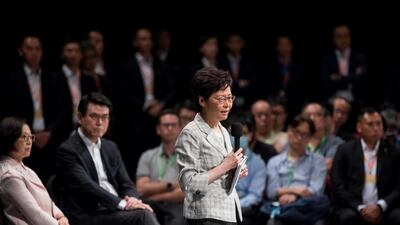Hong Kong's embattled leader rejected calls for more autonomy from China and an independent inquiry into police conduct as she held the first of a planned series of meetings with residents to address concerns that have fuelled months of protests.
“I believe this is a very good first step towards resolving this crisis,” Chief Executive Carrie Lam told the 150 people gathered at the city’s Queen Elizabeth Stadium on Thursday.
The participants were randomly selected from about 20,000 people who sought to attend the event. Thirty were allowed to speak after being picked in a draw of lots.
Ms Lam said the “community dialogues” she had initiated were not mere “political shows” and that she would work with colleagues to address the concerns raised. But despite her attempt to defuse anger, the event was largely shaped by the attendees’ fiery questioning and accusations.
The issues raised by protesters took centre stage inside the stadium, particularly the question of whether Ms Lam’s government will establish an independent committee of inquiry to look into police conduct during the protests.
Ms Lam insisted that she trusted the Independent Police Complaints Council to handle the investigations and refused to establish another independent committee. “IPCC has promised to publicise its report within six months,” she said. “We have invited foreign experts and have collected evidence from the public.”
According to a poll conducted by the Chinese University of Hong Kong, more than 70 per cent of Hong Kongers believe the least they can accept from the government is the establishment of an independent committee.
The survey, covering 623 Cantonese-speaking Hong Kong residents over the age of 15, was conducted on September 16, the 100th day since the protests were launched to demand the withdrawal of legislation to allow extradition of criminal suspects to China.
Questions about the independent inquiry resonated with people following a livestream of the event online, especially on LIHKG, a platform frequented by pro-democracy protesters.
“Good questioning! Our demands have moved way beyond the withdrawal of the evil extradition bill – Five Demands, Not One Less,” one person posted on LIHKG, using the popular slogan chanted by protesters.
Although the government scrapped the extradition bill after weeks of demonstrations, the protest movement’s demands expanded to include greater democratic freedoms, the resignation of Ms Lam, the release of detained protesters and an independent inquiry into alleged police brutality.
Pro-democracy protesters are also unhappy with the timing of the dialogue. More than 100 days have passed and more than 1,500 people have been arrested in the course of the protests. During this period, not once has the Hong Kong government met representatives of the protesters.
“If you really want to have a ‘dialogue’ then talk to the two million protesters who took to the streets instead of selecting 150 individuals who most likely won’t represent the majority of the pro-democracy movement, and only giving each questioner three minutes to talk,” one participant told Ms Lam on Thursday.
The meeting was held just days before China’s National Day celebrations on October 1, with grand events planned on the mainland to mark the 70th anniversary of the founding of modern China.
Pro-Beijing participants also called for an independent commission, but to look into the forces behind the riots.
“I recommend to investigate the causes of the riots,” said one. “Other than the police, teachers and social workers, religious leaders must also be investigated.”
Ms Lam underlined her government’s commitment to the “One Country, Two Systems” principle under which Hong Kong, which was returned to China by Britain in 1997, is a special administrative region enjoying semi-autonomy.
“If Hong Kong gains autonomy, then it is not ‘One Country, Two Systems’,” she said.

